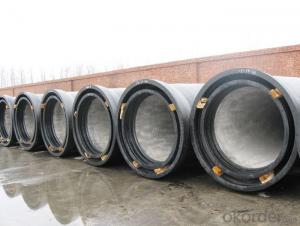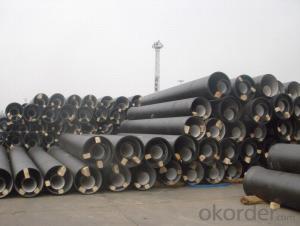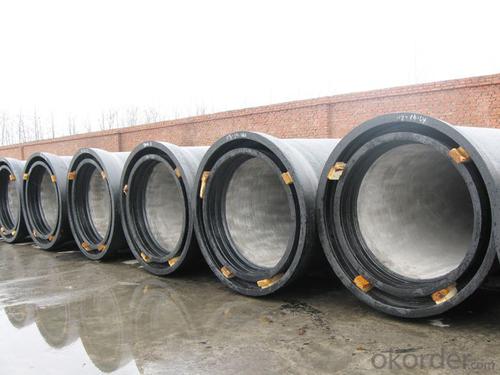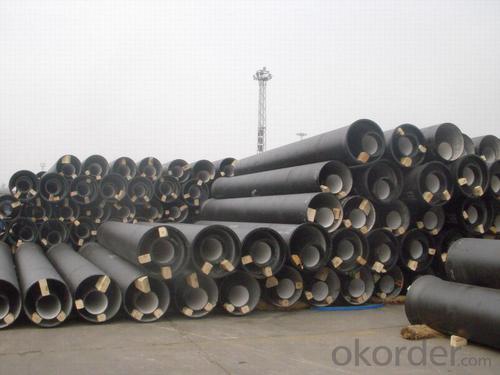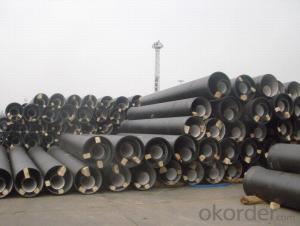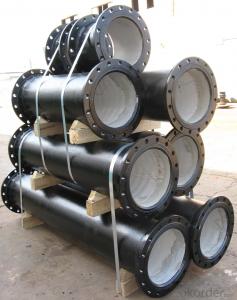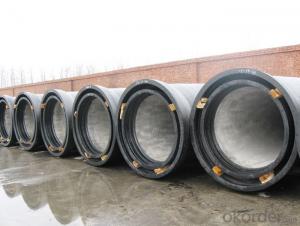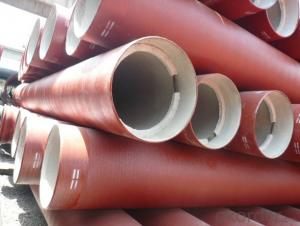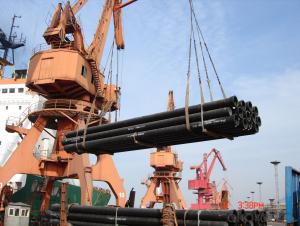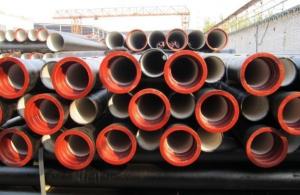Ductile Iron Pipe ISO2531 / EN545 / EN598 C Class
- Loading Port:
- China main port
- Payment Terms:
- TT or LC
- Min Order Qty:
- 20 m.t.
- Supply Capability:
- 200000 m.t./month
OKorder Service Pledge
OKorder Financial Service
You Might Also Like
1.Ductile Iron Pipe Description :
1) Pipes confirm to ISO2531,K9 class,T type joint,6m long,with inside cements lining conform to ISO4179, outside Zinc
spraying(130g/m2) and bitumen coating(70μm) conform to ISO8179.
2) Pipe ends: Spigot and socket ends, with 100% SBR rubber gaskets accoding to ISO4633
3) we can do third party inspection according to customer's request.
2.Main Features of the Ductile Iron Pipe:
1).Quality guarantee
• Chemical checking
• NDE after rough machining
• Mechanical testing after heat treatment
• Final NDE,dimension inspected
2).Quality document
• Full Q.A document as per client request
3).Packing and Shipping
• standard export package(carton/wooden case/pallet)
• accept FOB,FAS,CNF,CIF door to door etc or customer designated shipping agent
4)Inspection
• In-house Foundry
• Third party inspection available upon requirement
3.Ductile Iron Pipe Images:
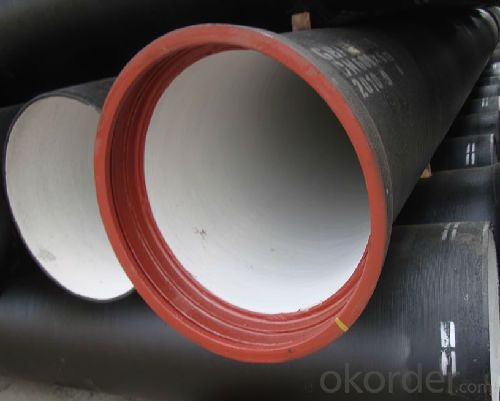
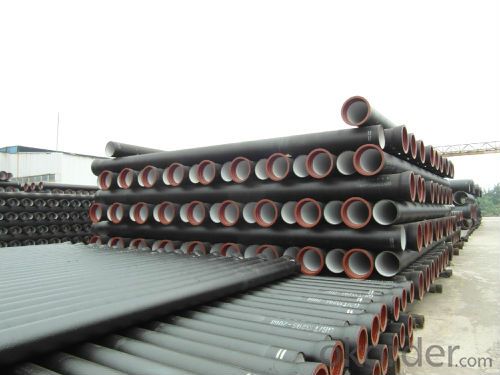
4.Ductile Iron Pipe Specification:
End Finishes: Beveled, Square Cut, Threaded, hat
Additional Services: Internal Coating
Packaging: packed in bag, plastic bag, steel strip, steel wire,double wire, iron box, wooden box, tarpaulin, plastic
sheeting
Test: X-ray, UT, magnetic particle,inspection,hydrostatic test.
Processing service: Beveling, Threading, Slotting, Cut-to length, Bends, Quench and Temper, Fabrication, Double-jointing
and On-site assistance
Documentary: MTC, material certification,Origin certification, CI or PI,Test Report, export licence, handling order,B/L,insurance policy,shipping instructions, contract, packing list etc.
5.FAQ:
We have organized several common questions for our clients,may help you sincerely:
1.Q: Why would you choose ductile iron pipe rather than other pipe materials?
A:The reasons are obvious for that not only ductile iron pipe possesses the inherent strength and flexibility of ductile
iron, combined with proven corrosion protection systems, but also the cost savings can be achieved from design to
installation and commissioning.
2.Q:Why can you guarantee the inner of pipes can’t be corroded?
A: High alumina cement mortar lining and sulphate-resistant cement mortar lining. These two special linings are applicable
to inner anti-corrosion for sewage pipes, improving resistance to erosion of the sewage components.
- Q: Ways of connecting ductile iron pipes
- In accordance with the wall thickness or pressure capacity, ductile iron pipe is divided into K8, K9, K10, K11, K12 four class, where the contract does not indicate, according to K9 supply.
- Q: Can ductile iron pipe be used for hot water applications?
- Indeed, hot water applications can make use of ductile iron pipe. Renowned for its robustness, longevity, and exceptional resistance to corrosion, ductile iron pipe proves itself ideal for diverse applications, including hot water systems. Its capability to withstand high temperatures and pressure renders it a dependable choice for the conveyance of hot water. Moreover, its thermal conductivity properties facilitate efficient heat transfer, guaranteeing the effective delivery of hot water throughout the system. Consequently, when evaluating materials for hot water applications, ductile iron pipe emerges as a fitting alternative.
- Q: Can ductile iron pipe be used for water supply to remote areas?
- Yes, ductile iron pipe can be used for water supply to remote areas. Ductile iron pipe is known for its durability, strength, and corrosion resistance, making it suitable for long-distance water supply systems. It can withstand challenging terrains and harsh weather conditions, ensuring reliable water supply to remote areas.
- Q: Ductile iron pipe joint damage, water leakage, want to see the connection with other pipe fittings, how to operate?!
- Sawing grinding head, increasing steel socket set
- Q: Are ductile iron pipes suitable for use in irrigation pivot systems?
- Indeed, irrigation pivot systems can undoubtedly make use of ductile iron pipes. This particular material possesses remarkable strength and durability, enabling it to endure the immense pressures and stress typically encountered in irrigation systems. Moreover, it exhibits resistance against corrosion and can withstand the continuous exposure to water and a variety of chemicals commonly employed in irrigation practices. Furthermore, the smooth interior surface of ductile iron pipes assists in maintaining a consistent water flow and mitigating frictional losses. In summary, the strength, durability, and corrosion resistance of ductile iron pipes render them a dependable choice for irrigation pivot systems.
- Q: Can ductile iron pipe be used for potable water systems?
- Yes, ductile iron pipe can be used for potable water systems. Ductile iron is a strong and durable material that is resistant to corrosion and can withstand high pressure and flow rates. It has been widely used in potable water systems for many years due to its reliability and longevity. However, it is important to ensure that the pipe is properly coated or lined to prevent any leaching of iron into the water.
- Q: Can ductile iron pipes be used for geothermal energy systems?
- Yes, ductile iron pipes can be used for geothermal energy systems. Ductile iron pipes are known for their strength, durability, and resistance to corrosion, making them suitable for various applications, including geothermal energy systems. They can effectively handle the high pressures and temperatures associated with geothermal energy production, making them a reliable choice for transporting hot water or steam. Additionally, ductile iron pipes have a long lifespan, reducing maintenance and replacement costs for geothermal energy systems.
- Q: How is ductile iron pipe recycled?
- Ductile iron pipe, a material known for its durability, is commonly used in infrastructure systems like water and wastewater pipelines. Rather than being disposed of in landfills, ductile iron pipe can be recycled when it reaches the end of its life cycle. The recycling process for ductile iron pipe begins by removing it from the ground. Typically, a trench is dug to access the pipe, which is then cut into smaller, manageable sections using specialized equipment. These sections are then transported to a recycling facility. At the recycling facility, the ductile iron pipe undergoes further processing to eliminate any contaminants. This involves removing any fittings or joints that may be attached to the pipe. Additionally, non-iron materials like rubber gaskets or coatings are separated and discarded. Once the pipe has been cleaned and prepared, it is usually crushed or shredded into smaller pieces. This increases the material's surface area, making it easier to melt down in the next stage of the recycling process. The crushed or shredded ductile iron pipe is then melted in a furnace at high temperatures, a process called smelting. Smelting converts the solid iron into a liquid state. During this process, impurities and any remaining non-iron materials rise to the surface and are removed. After smelting, the molten iron is poured into molds to create new products. These molds can produce various ductile iron products, including new pipes, fittings, valves, and manhole covers. The recycled ductile iron products possess the same qualities and durability as those made from virgin materials. Recycling ductile iron pipe not only reduces the need for new materials but also conserves energy and resources. The recycling process requires less energy compared to producing iron from raw materials, resulting in a lower carbon footprint. Furthermore, recycling ductile iron pipe helps minimize waste and promotes a circular economy by giving new life to a previously discarded material.
- Q: How do ductile iron pipes handle internal scale buildup?
- Ductile iron pipes possess exceptional resistance to the accumulation of internal scale, making them highly regarded. The material utilized in these pipes displays remarkable resistance to corrosion, effectively hindering the formation of scale deposits. Moreover, the pipes' sleek internal surface considerably reduces the likelihood of scale adherence. In the unlikely event that scale does commence its formation, ductile iron pipes handle it proficiently. The inherent robustness and durability of ductile iron enable it to withstand the pressure exerted by scale buildup. Consequently, the pipes can maintain efficient functionality, even in the presence of some internal scaling, thereby ensuring a dependable water flow. Nevertheless, it should be emphasized that regular maintenance and periodic cleaning remain imperative in order to prevent excessive accumulation of scale and ensure optimal pipe performance. This can be achieved through a variety of methods, including mechanical cleaning, chemical treatments, or high-pressure water jetting. By adhering to proper maintenance practices, the lifespan of ductile iron pipes can be prolonged, while minimizing any potential issues associated with internal scale buildup.
- Q: Are ductile iron pipes suitable for sewer force mains?
- Yes, ductile iron pipes are suitable for sewer force mains. Ductile iron is a type of cast iron that has a higher level of strength and flexibility compared to traditional cast iron pipes. This makes it ideal for applications where the pipes need to withstand high pressure and heavy loads, such as sewer force mains. Ductile iron pipes have excellent resistance to corrosion and are highly durable, which is crucial for sewer systems that are exposed to various corrosive substances and harsh environments. They also have the ability to absorb vibrations and shocks, reducing the risk of pipe failures caused by external forces. Furthermore, ductile iron pipes are known for their long service life, often lasting for more than 100 years. This makes them a cost-effective choice for sewer force mains, as they require minimal maintenance and replacement over their lifetime. Overall, ductile iron pipes offer a reliable and durable solution for sewer force mains, providing the necessary strength, flexibility, and resistance to corrosion to ensure efficient and long-lasting sewer systems.
Send your message to us
Ductile Iron Pipe ISO2531 / EN545 / EN598 C Class
- Loading Port:
- China main port
- Payment Terms:
- TT or LC
- Min Order Qty:
- 20 m.t.
- Supply Capability:
- 200000 m.t./month
OKorder Service Pledge
OKorder Financial Service
Similar products
Hot products
Hot Searches
Related keywords
